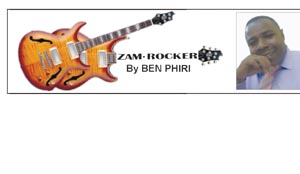 It was not only the name Osadabwa that thrilled fans but the band’s membership composition as well.
It was not only the name Osadabwa that thrilled fans but the band’s membership composition as well.
Four musicians teamed up within a few days to form a powerful group that rocked the Copperbelt and beyond.
The band that came up in Ndola’s Chifubu Township towards the close of the 1970s, was managed by business executive Peter Chisambi who also owned the Chisambi Bus Service empire.
Chisambi quickly got glued to the idea of Osadabwa coming into being and bought them powerful instruments and provided all the logistics it needed to be mobile.
Osadabwa (Don’t be surprised), revealed sensational musicians that went on to light up early days of the Zamrock era that exposed rare talent in music.
Legends such as Ricky Banda who played bass and Ackim Simukonda, who was on lead guitar, were part of the band’s composition.
The band also had Eddie Kaira on second guitar and vocals, Moses Phiri (lead vocals) and Darlington Chitupila who is the current Chief Mailo of the Lala speaking people of Serenje District in Central Province, taking charge of the drums.
“We poached Ackim Simukonda from a band that was performing at the Hide Out Bar and that is how he came to join Osadabwa,” said Kaira, one of the surviving members.
The band came up at the time of heavy competition from established bands that included the Tinkles, Fire Balls, Witch, Yatagans, Osaye and Peace among others, that provided a bulk of colourful weekend entertainment on the Copperbelt.
Although Osadabwa made a giant leap on the local music platform, did not record anything except backing their compatriot Ricky Banda on his block buster Chifundo Pa M’tima single, which topped the local music charts and as an anthem on the radio airwaves.
“We did not record as a band but we backed Ricky on his Chifundo song. All the instruments in that song are all done by Osadabwa,” Kaira said.
The following years served as a litmus test for the band that wanted to come up with its own compositions to supplement foreign covers but sadly, that never materialised as expected.
“Our concentration really was on ensuring that we played music that matched international bands we wanted to compete with. This is what helped to expose and perfect Zambian bands,” Kaira added.
Kaira said it was not easy to just enter the studio to record as being done by musicians of today, but took some time to perfect the songs.
“We came up with our own compositions quite alright but we could not record due to various reasons starting from lack of satisfaction about the quality, though our music was still good enough to compete at international level,” he said.
The band was all over the Copperbelt, Lusaka, and Eastern Province and from time to time, rocked venues like the Falcon Hotel, Tudor Inn on the Ndola Mufulira Highway, Ndola senior Police Club and Raylton Club.
Osadabwa played a mixture of music ranging from pop and blues, to hard rock of the likes of Deep Purple, Grand Funk, Santana and Butchman Turner.
The band also did perfect covers of Cliff Richard, Clarence Carter, Clear Water Revival, Rod Stewart, Beatles, Rolling Stones, Wilson Pickett and Elvis Presley.
A few years later, Simukonda was poached by He-She Mambo to go and form the Green Buffaloes Combo, a Zambia Army sponsored outfit which also lured veteran Randy Mulenga on lead guitar.
“I personally travelled to Ndola to get Ackim Simukonda who was then performing with Osadabwa at Chapasuka Bar in Chifubu Township. We then went to Lusaka to form the Green Buffaloes Combo,” said He-She Mambo in a recent interview from Kabwe.
He-She whose songs, Fresh Kapenta and Chikonjiwe, are still fresh in the minds of his fans, enjoyed massive air play, was lured in the Green Buffaloes Combo by former Army Colonel Douglas Mbiya who was then stationed at Tug Argan Barracks in Ndola.
“I think with the coming in of Ackim and a few others, made the Green Buffaloes Combo the best band that ever existed during the 1970s,” He-She said.
But the poaching of Simukonda revealed some cracks in the Osadabwa rank and file that started disintegrating rapidly shortly afterwards.
“After Ackim left, Ricky Banda also went away to South Africa to follow his wife who was working there. I also left to join the Yatagans and that was the demise of the band,” Kaira recalled.
That signaled the end as curtains closed quietly on the otherwise promising outfit that wanted to equal international bands in terms of capacity and music quality.
Comments: benjphiri990@gmail.com; 0971 933809; website: www.times.co.zm.






